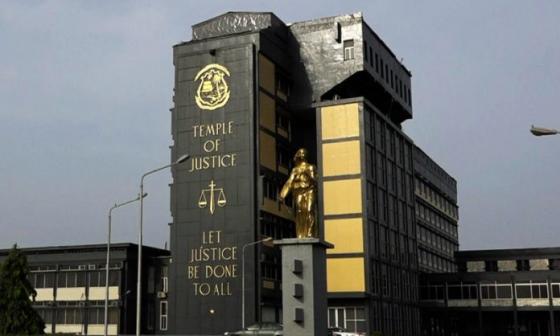Liberia: Supreme Court Denies CPP’s Request to Halt Voter Registration

Supreme Court of Liberia.
“We find no reason to disturb the ongoing voters’ registration exercise since the NEC is not in violation of the Constitution as regards Article 80(d)(e)” Justice Yuoh ruled.
The Supreme Court has unanimously denied the Collaborating Political Parties (CPP) request to halt the biometric voter registration process, which they claim is being conducted outside of the constitution.
The CPP's had alleged that the National Elections Commission's (NEC) decision to conduct voter registration exercises without first demarcating constituencies, as a result of a national census, runs contrary to Article 80 (e and c) of the country's Constitution.
However, the Supreme Court, having entertained arguments from the electoral body and that of the CPP, ruled that it saw no basis for disturbing the voters' registration exercise since the electoral body was not in violation of the Constitution as alleged.
According to the Court, the case does not constitute an election matter within the contemplation of the constitutional mandate that the Supreme Court hear and make a determination on an election matter within seven days.
“We find no reason to disturb the ongoing voters' registration exercise since the NEC is not in violation of the Constitution as regards Article 80(d)(e),” Chief Justice Sie -A-Nyene Yuoh ruled in a unanimous verdict.
“Hence, the mere fact that political parties, an alliance, a candidate, or the NEC are mentioned or challenged in a case does not also make the same an election matter; and that the Constitution must be interpreted in light of the entire document rather than a sequestered pronouncement, that every provision is of equal importance, even where there is an apparent discrepancy between different provisions,” Yuoh said.
The court ruling yesterday would allow the electoral body to move ahead with phase two of the voter registration exercise, having already conducted phase one, which was overshadowed by a series of technical glitches.
If the Court had ruled in CPP, it would have led to a delay in the election process as NEC would have been forced to halt phase one outcome — potentially reshaping the political landscape.
The CPP's had sought the intervention of the Supreme Court to compel the NEC to adhere to the Constitution and prevent any violations of its provisions related to elections.
They argue that allowing even one violation could lead to further violations, potentially impacting the timely conduct of the upcoming elections.
Article 80 (e), which the CPP claims was violated, provides that “immediately following a national census and before the next elections, the Elections Commission shall reapportion the constituencies in accordance with the new population figures so that every constituency shall have as close to the same population…”
Article 80(c), among other things, grants that every Liberian citizen has the right to be registered and vote only in the constituency where they are registered.
Liberia’s population, according to the provisional results released by LISGIS, stands at 5.2 million, an increase of 50.4 percent when compared to when it was 3.5 million. This represents a population gain of over 1.7 million people in the space of 14 years, with urban growth up by 52 percent and rural growth down by 48 percent.
“We have, therefore, asked the Supreme Court to demand that the NEC obey the Constitution, and not permit violations of constitutional provisions relating to the elections, without acting to correct such violations. If we permit one violation, we risk permitting others, including the timely conduct of the elections,” the CPP said in its complaint.
The Ministry of Justice and the NEC, however, argued that the voter registration exercise was not in violation of the Constitution, as alleged by the CPP.
They asserted that the demarcation of districts in accordance with the Census cannot be done until the full census results are released, and NEC can then submit a threshold bill to the legislature.
Article 80(d) and (e), according to the Court, are linked and interdependent; as such, they are not self-executing but based upon the precondition that a census report be concluded and submitted to the Legislature.
The Court noted that it is the duty of the Legislature to create the threshold, which then shall empower the electoral body to reapportion the constituencies in accordance with Article 80(e) of the Constitution.
“While NEC has a duty under Article 80(e) to reapportion constituencies, the said duty is not self-executing. The duty to reapportion constituencies can only be executed based upon the preconditions that a national census report be concluded and submitted to the Legislature, and the Legislature creates the laws, and then the NEC performs its duty to reapportion the constituencies pursuant to Article 80(e),” Yuoh said.

